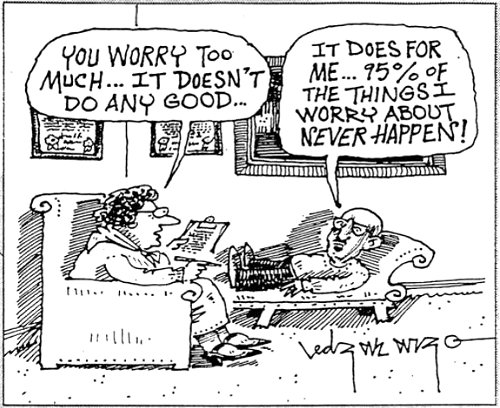Somewhere along the line, anxiety got a bad rap.
There’s a consensus in our society that experiencing even mild anxiety is a negative thing. If possible, it should be avoided. If it does unexpectedly sprout up, most of us believe it should be alleviated quickly.
How many times have you been in situations where someone on your team starts to experience some anxiety (perhaps for a good reason) and you feel the need to come to his or her aid?
Your “open door policy” becomes a place where agents come to be comforted and assured that everything is going to turn out fine.
I’ve been in several meetings where managers express sincere exasperation in the performance of this role—everyone seems to have a problem and they want you to fix it. Now!
If you’re experiencing your own level of anxiety from these types of interactions, I have some good news for you today. Being a little less comforting and empathetic may be a good thing.
In fact, according to research done at Boston University, you may be hurting those you’re trying to help by alleviating their anxiety.
We All Hate Anxiety…
Charlie Kurth, an assistant professor at Washington University, recently described the research on this topic. It’s a long article, so I’ll give you a few highlights here, and you can read more on your own if this topic interests you.
The human race’s aversion to anxiety dates back to the earliest recorded history.
But just how bad is anxiety, really? Is it just an unpleasant feeling to work through, or something worse?
According to a very distinguished tradition, one that stretches all the way back through the Stoics and Aristotle to Plato, it is worse. Much worse. When we’re anxious, we fret and ruminate in ways that don’t just distract us, but consume us.
What’s more, because anxiety tends to be so unpleasant, we act impulsively – doing whatever we think will make the feeling go away. For these reasons, the classical consensus has it that such emotions are to be avoided.
…But, It May Be Good for Us
Kurth makes the point, the “classical consensus” about the harmfulness of anxiety may be wrong.
The idea of anxiety as a helpful emotion stands in sharp contrast to the skepticism [of philosophers].
But it’s a vision endorsed by clinical psychologists such as David Barlow, founder of the Center for Anxiety and Related Disorders at Boston University. As Barlow explains in Anxiety and Its Disorders (2002), anxiety ‘functions to warn of a potential danger situation and triggers the recruitment of internal psychological mechanisms’.
These mechanisms are important because they allow us to engage in ‘a higher and more mature level of functioning’. In run-of-the-mill social anxiety, for example, we have an emotion that enables us to better understand and navigate our social interactions.
Think Twice Before Rescuing Your Agents
There are a lot of complexities in this topic we can’t cover here, but it’s important to open your mind to this idea:
Experiencing some anxiety on a periodic basis may be a pathway to higher-level thinking and better performance. Kurth puts it this way:
It’s an emotion that gets us to do things, things that can help us to address our predicaments in distinctive ways…. We might start thinking about the options available to us, considering the reasons for and against each. We might also seek out more information from those we trust. [It can be] a motivator that prompts such things as deliberation and information-gathering.
These are all good things for an agent to pursue in solving problems and finding solutions. By rescuing them from their anxiety, you may be robbing them of a breakthrough only the stress of anxiety could produce.
Questions or Comments? Reply to your WorkPuzzle subscription email.
Didn’t get the WorkPuzzle email? Subscribe below. We promise not to share your email with others or use it for any other purpose but delivering WorkPuzzle notices.



